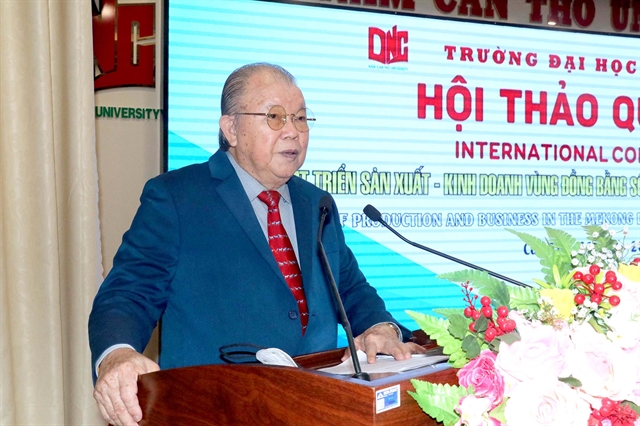.jfif) Opinion
Opinion

Professor Võ Tòng Xuân, Rector of Southern Cần Thơ University, spoke to Vietnam News Agency about orientations as well as solutions to develop a green, low-carbon agriculture sector in Việt Nam.

|
| Professor Võ Tòng Xuân. VNA/VNS Photo |
Professor Võ Tòng Xuân, Rector of Southern Cần Thơ University, spoke to Vietnam News Agency about orientations as well as solutions to develop a green, low-carbon agriculture sector in Việt Nam.
How do you assess the prospects and challenges for green agriculture development?
Green agriculture can simply be understood as agriculture that is suitable for the ecological environment, without emitting greenhouse gases. To achieve green agriculture, Việt Nam needs to realise the practice of not emitting greenhouse gases.
Agricultural production needs to be quality-oriented to keep the environment sustainable, and we cannot expect very high productivity as before. The economic efficiency has become clear when applying the process of reducing number of species, breeds and varieties, reducing the use of fertilisers, and reducing the use of pesticides, while increasing yield, quality and economic efficiency.
The synchronous application of these processes, in addition to the economic benefits, also helps to reduce the effects of climate change.
Currently, most farmers do not practice green agriculture because they are using too many chemicals, especially chemical fertilisers. When farmers abuse chemical fertilisers, it will cause reactions in the soil, turning chemical fertilisers into greenhouse gases, causing climate change.
For example, farmers who grow rice crops, and use a lot of fertilisers, will produce a lot of NO2. This is a toxic gas, making the atmosphere warm, and causing climate change.
Farmers around the world are moving towards applying green agricultural production, using microbial and organic fertilisers instead of chemical fertilisers. This will help restore the soil to its original condition with many microorganisms, which can turn the minerals in the soil into natural nutrients for plants. Since then, farmers' products are clean, safe and hygienic, and at the same time, the climate will not be changed.
When moving from a resource-abuse agricultural production, depending on chemicals, to green and environmentally friendly agriculture, there are still many barriers. What do you think is the biggest?
The biggest barrier is the lack of knowledge of farmers about science. When farmers do not have the knowledge, it is easy to abuse chemicals. Farmers need to be aware that the use of chemicals to increase productivity and boost crop production in the early stages will give high yield, but later on, the results will not be as expected and even be harmful to plants, soil and water.
The important issue is to improve knowledge for farmers, the first people who have affect on agricultural production.
Now, farmers have started to notice that their raw materials exported to markets, such as to the EU, have been returned due to violations of banned substances, and poor quality. Farmers need to see the need to change their agriculture practice and production. If they continue to produce in the old way, their products will not be sold.
On the other hand, I think that the State needs to actively provide information to farmers to act toward green and clean agricultural production.
What mechanisms and policies should the State have in place to create conditions for businesses and farmers to develop green agriculture?
The Government needs to bring farmers into cooperatives and production groups to jointly produce according to clean agricultural processes. When farmers participate in production with standard processes, their products will be consumed by large corporations and businesses at higher prices. Then, farmers will see that, if they follow clean and green agriculture, they will not suffer losses thanks to higher product prices.
When practising connected production, farmers will be able to apply new science and technology. In zero-emission agricultural production, farmers can also benefit from the sale of carbon credits. The sale of carbon credits also generates financial support for farmers, but the greater benefit is to help clean air and water environment, suitable for natural ecology.
Currently, many businesses associate with cooperatives and farmers to produce clean agriculture products. Farmers are guided with the production from the beginning with technical processes. Enterprises also buy raw materials for farmers. If farmers produce “green” products, the products can also be exported well.
For example, let’s take a look at the green agricultural production models of Trung An Hi-tech Agriculture Joint Stock Company. Farmers are associated with businesses, products are guaranteed in terms of quality according to market requirements, and farmers also benefit from that result. These are models that need to be promoted and replicated.
Businesses that can do clean and green agriculture need to be encouraged so that businesses can lead farmers to participate in the green agricultural market.
The role of business is key. The State needs to have mechanisms and policies to encourage and attract enterprises to take the lead in building green agriculture so that they can open the market. Once they are able to open the market, enterprises will return to the raw material area to apply technological advances to produce clean agriculture. From the requirement of the market, businesses will "control" farmers to produce green and clean products.
Along with that, the State must also have strict regulations on the use of hazardous chemicals. The trading and use of banned toxic chemicals must be checked, controlled and severely punished if detected by the authorities. VNS




